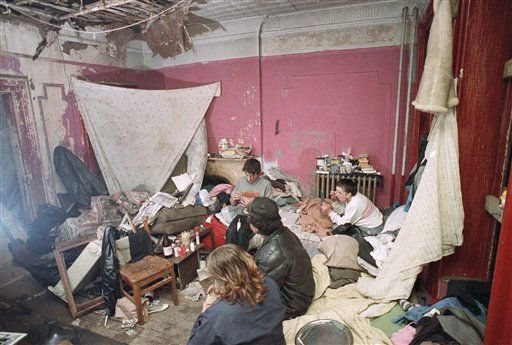The Tragedy of the Commons, Part I
The tragedy of the commons is a game theory used as much against government, as it is against anarcho-capitalism, and it is an argument more advanced than, “Who will build the roads?”. In it, the argument is made that responding to hard drug abuse, free riding, animal abuse, pollution, and other acts that are immoral, yet unaggressive, with aggression or means of violence, is an initiation of force and thus inconsistent with the nonaggression principle.
These acts could include the aforementioned,
- Blackmailing,
- Lying,
- Sexual Harassment,
and
- Fraud
Prosecution of those who offend through a private court systems is seen by some to be an initiation of force, since enforcement of law is apparently an initiation of force, so here are the solutions I propose:
Hard Drug Abuse
Recently, I engaged in a debate about the tragedy of the commons with two friends of mine, and one of them brought up an excellent counterargument:
The issue is whether we retaliate, with force, against behaviors that libertarians traditionally do not regard as property violations. If someone is running a crack house next door, a libertine libertarian would say that’s their right as a property owner and you must not retaliate or you are the aggressor and will be suppressed by law. I say, there are plenty of reason[s] to retaliate against the crack house because they are imposing costs on me by various means, decreasing my property value, endangering my kids, disrupting peace and good order, bringing an undesirable element in and so on and so forth. Just telling people not to retaliate doesn’t prevent conflict, but will only lead to it.
- Eli Harman
The libertine libertarian counterargument to such a claim could include:
- “Crack houses and meth labs are an offshoot of Prohibition.”
It could be argued that, while speakeasies were also clandestine buildings that honed use of a substance that was outlawed, but later proven to be harmless, alcohol can be used responsibly, narcotic drugs cannot.
- “Legalization of hard drugs would lead to less drug-related crime.”
Crack is so highly priced because junkies will pay any price for it even if it means they have to steal to obtain it and dealers notice that. Whether legalized under the state, or permitted in a free society, the sale of drugs would have no price ceiling, as it is with any other sumptuary or harmful product, so price gouging would not be enforced. Dealers/companies could get away with pricing the product as they wish; crackheads would continue to steal money to support their habit.
- “With the sin tax eliminated, the burden of the poor (i.e., those who resort to using crack) would be lightened, and thus would the need to steal.”
Prices are affected by the amount of people who buy the drugs. Most people, even libertarians, do not use crack and there aren’t going to be many people using crack, even without the government-sponsored programs infiltrating the schools with their anti-drug propaganda, because the public will see in plain view what happens to people who use it.
- “The companies could just hire more people to work in the factories and produce crack at a higher rate than those who cook it in their sinks.”
This is a Keynesian outlook of supply-side economics, a theory in which there are more jobs available with more areas of work proliferating as a response to a nonessential or destructive field. Most people will not work in drug manufacturing, due either to ethics or lack of experience. Comparison to alcohol aside, crack houses are, indeed, a byproduct of Prohibition, and so is domestic manufacturing of the product. Legalization or decriminalization would lead to an industrialization of the product and experienced chemists or robots would be selected to work in those fields for the sake of efficiency.
So, what is the solution to crack houses?
Well, it has recently been accepted amongst lesser libertarian pundits, such as myself, that businesses would pay for the roads through a monthly fee and it was previously mentioned that crack houses were the result of Prohibition. Let’s say that crack houses look as presentable as 1920’s speakeasies and imagine a place where crack would be sold. The roads would avoid routes to such an establishment at all costs because the last thing anyone wants is crackheads driving on their roads.
Road companies could also keep junkies off their roads by issuing policies requesting a report on the buildings in neighborhoods thorough which their roads run to discourage mortgage companies from allowing any buildings on their property to be abandoned and thus open to use for illicit activity. (Though very similar to taxation, this is not a violation of property rights, since the maintenance of their roads is at stake.)
Free Riding
While on the subject of indigence, let me start by saying that it is impossible to free ride on commons in a world where crowdfunding a public space would be voluntary, but it would still be important to address it because it could have an affect on the economy of a free society, be it through a tenant being delinquent on his rent and costing the landlord mortgage expenses, or a business being delinquent on their road fees. Removing the delinquent tenant and barricading the routes to the place of business would be ways to combat these issues while respecting property rights, but the former would be impossible to actualize without use of aggression, which would ultimately be initiated.
Think about an auto insurance company raising its rates for male drivers based on the likelihood of them getting into a car accident or a single mother being allowed less than she needs in welfare because she has so many children. Most companies would avoid the risk of a client not paying by requesting credit information before approving them, just as most businesses would not employ without resumes or permission to contact the employer.
Long story short, cutting off the guy’s water and electricity would be enough to get him out and wander in destitution, but the landlord, himself, could commit fraud by owning so many pets that he spends more providing for them without factoring in a budget big enough to make his mortgage payments, despite the tenants meeting their deadlines, but rising up against him would be a violation of property rights and a violation of the nonaggression principle. The mortgage companies, however would be doing neither by foreclosing on his house. In both instances, the delinquent would initiate force by threatening those who try to remove them with means of aggression, in which case, they would be the one initiating the force against the owner on property that he owns and retaliation would be consistent with the nonaggression principle (unless one defines the initiation of force as the actual pulling of the trigger or throwing of punches, at which point it would be wise of you to stop conversing with them).
However, dismissal or eviction happens when employers or landlords do not realize they have made a mistake until it is too late to redact the contract. As an alternative, they could allow the person to stay and reciprocate themselves for potential losses by making cutbacks or raising rent, respectively. If there is no clause in the contract to which the employee agreed stating that pay, benefits, or rent were subject to change, any changes made to the employees’ stipends, or tenants’ fees are theft by proxy, at which point, the Proudhonian claim that “rent is theft” would be pertinent—the difference in rent and taxation being a contractual, and consensual agreement being made, of course. Theft by proxy is exactly what taxation represents—the blue- and white-collar worker taking on the tax burden for corporations who will not pay for people who receive welfare—and that same gun used to remove the delinquent tenant from commons could be turned on those who are delinquent subsequent to rent hikes.
Animal/Child Abuse
The nonaggression principle applying to the rights of animals has been controversial. On one hand, pets/livestock are sentient beings that can feel pain, on another, they are property. So, is abuse of a pet the same as wrecking one’s own car? It goes without saying that some would say, “Yes,” and some would say, “No,” but those who respond negatively raise a couple rhetorical questions.
- Will harming the animal be of a loss to the abuser?
The answer is “Yes”.
- What separates the toy poodle from the poodle toy?
“Sentience” is not an answer, smartass, but the libertarian response to what others do with their property would be withdrawal. Because I had no contribution to buying the pet and do not know as much concerning the relationship between the pet and his owner, as the abuser, all I can do is judge him based on what I see. A dog that looks as if it hasn’t been fed in days may be have been neglected by their owner, or may have an owner who is too poor to afford its chow. Conversely, a clowder of well-fed cats may have a loving owner or an owner who wants to fatten them up for fear of an imminent famine. Whatever the case may be, it is unfortunately not my right to intervene.
However, such abuse cannot happen on commons without repercussions of some sort from an appointed third party, which in this case would be those who patrol the property. Under the nonaggression principle, private property is no different from personal property. If, for instance, a hitchhiker were to hold the owner of a vehicle at gunpoint, the driver would be within their rights to force them out since force was initiated against them. Imagine a small child left in that same car, while the driver goes into a weapons store to get some Mace in case this happens a second time. If a bystander were to walk by and find the toddler sweating in the hot vehicle, his kneejerk response would be to break the window to get it out, at which point, the driver would return with her Mace, and having found her vehicle damaged and the baby with whom she was entrusted in the arms of a stranger, would use it for the first time and demand compensation. If the area were patrolled, this problem would be eliminated. The security patrolling the area would, instead, be alerted and call for the owner of the silver Kia Soul to tend to her child and roll her windows down or turn on the air conditioning, or have her car towed. Towing the car is not an act of aggression.
What is done on the commons can be corrected by those entrusted with the protection of the area that surrounds it.
Pollution
So many actions can be categorized as pollutant. Cigarette smoke contains carcinogens that are harmful to the environment, as does the exhaust from large freight trucks and the piles of ashes that blow away and run off into nearby water sources. We are just as aware of, as we are oblivious to these things; none of this is news, but we don’t care all that much. Our obdurate outlook has not stopped businesses from setting up policies that, while mostly anthropocentric, inherently combat pollution, like nonsmoking policies, fines for littering, banning Styrofoam coolers, or simply setting up a trash bin outside of the building or at the end of each corridor. These policies seem so familiar because they can be found on the placards on public parks, beaches, lakes, etc. and violations of these rules are subject to state fines. When government no longer owns these facilities, they will become commons until they are privatized.
Conversely, it is not unusual for libertarians to be asked how a free society would function without the Environmental Protection Agency, a government agency that was established in 1970 and has still been powerless in regulating the environmental impact of mega-corporations. One would argue that privatizing areas that could become polluted would be a sensible palliate to a practically noncontributory multibillion dollar agency funded by the public.
With the EPA abolished or nonexistent in a tax-free society and land appropriated for industrial purposes, the venture capitalists who have been entrusted with the land would have no room for opportunism. They would have no choice but to be judicious in how they manage the many acres of land they have purchased for profit.
Take the lumber industry as an example.
In a subreddit relative to this topic, one Redditor argued against the lumber industry being sustainable on its own by stating,
[T]he dangers of having little forestland should be extremely obvious and concerning to anyone who breathese [sic] oxygen or uses wood products and byproducts, who would not like the prices on these products to rise based on scarcity. Also you’re arguing that the logging industry is self-sustaining because it is profitable and saying that the government should not regulate this logging. However the only reason the logging industry is sustainable is because the replanting of forestland is being subsidized. You remove the tax incentives from the equation and the data shows logging companies start cutting more than they replace.
Looking at a deregulated logging industry from an existential standpoint is acceptable, but not affirmative. Tax incentives, such as the Soil Bank Program and its replacement, the Conservation Reserve Program, have encouraged logging companies to replant after logging. One could see this and say that replanting would not have been practiced without these tax incentives being passed, which would essentially mean that a bill that has been advocated since the 1950’s and was not enacted until 1985 would have kept businesses from finding a solution to rapid deforestation and potential scarcity of the very material in which they have invested, which is laughably ludicrous. If anything, the process of passing the bill delayed any motion toward an alternative.
Conversely, there is evidence supporting efficiency in the lumber industry when there is more investment in economies of scale.
Over the 20-year period, [pulpwood] mills in size categories above 1,000 tons have increased their relative share of total capacity [...]. Meanwhile, the share for mills in the smaller categories—1,000 tons or less—has declined. According to the precepts of survivor analysis, therefore, the range efficient size mills is 1,000 [tons per day] or larger. It is notable, however, that mills above 1,750 tons have not increased their share as much as those in the range from 1,000 to 1,750 tons. This may indicate some diseconomies in the largest sizes, such as higher wood costs, but if engineering estimates continue to favor expression of capacity at existing mills, these sizes may show greater growth in the future.
- James E. Granskog, Economies of Scale and Trends in the Size of Southern Forest Industries, April 1978
So, there you have it! A demand for more lumber means more common land to be privatized. (The diseconomies in the larger sizes are simply risky investment due to the high cost of production.)
Part II soon to follow. Thanks for reading.




The reason governments can't solve pollution problems is because of the tragedy of the commons. The river is not owned by an individual and thus there is no one harmed by polluting the river. If river is owned then the owner can bring a suit against the polluter. Governments will not side with the polluter because they pay more taxes or give more money to the law makers.
Fixed.